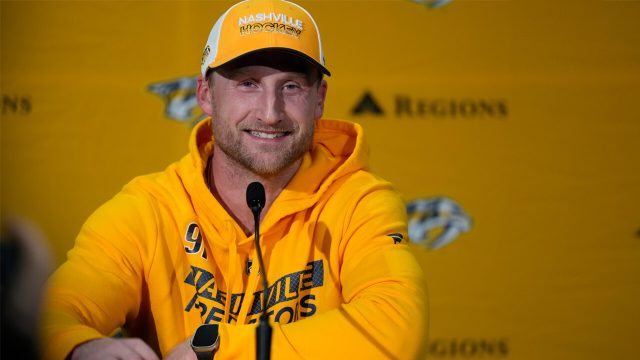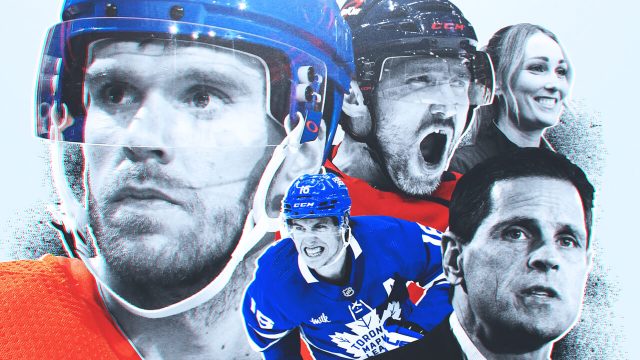
“HE’S GOING TO BE A FAN FAVOURITE”
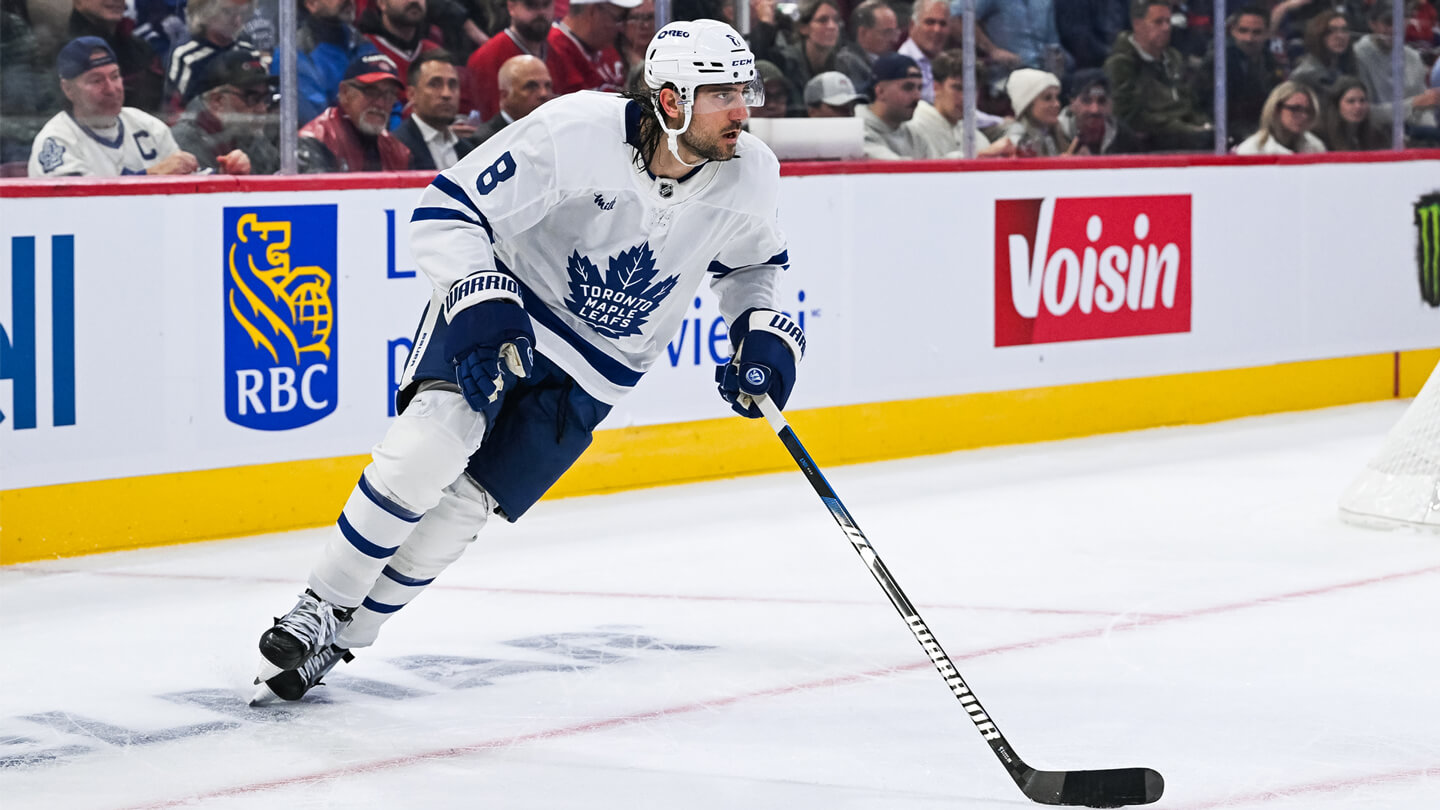
C
hris Tanev had been in the NHL a decade by the time he met Noah Hanifin, his D partner in Calgary and now one of his closest friends, so it’s probably not surprising he was already a bit dinged up. Ahead of the 2020-21 season, their first of four together with the Flames, Tanev “didn’t have too many teeth left to lose,” Hanifin says, which explains why a hit he took last season had his teammates fearing the worst. “He has this one little tooth left in the front — his ‘snaggle tooth’ we call it — and we thought for sure he’d lost it,” Hanifin says. Tanev’s mouth was cut and bleeding, but the tooth was eventually accounted for. “It was saved,” Hanifin says. “It somehow ended up staying in his mouth.”
Following a recent practice in the west end of Toronto, which saw Tanev put his survivors to use chewing gum for the duration — he always chews gum, during both practices and games — he tried to figure out exactly how many teeth he’s missing. “I think right now it’s five-and-a-half, but I could be wrong,” he admitted, unsure whether he’d had that half tooth built back up recently. “At one point it was like seven.”
Born in Toronto, Tanev has returned to the city every summer since he turned pro 15 years ago. Now, after signing a six-year deal with the Maple Leafs this summer, he’s home to stay, and two of the people responsible for a gap in his mouth are teammates. When Tanev first arrived at Toronto’s training camp, he let Morgan Rielly and Mitch Marner know. “He said it happened against us — I shot the puck and Mitch tipped it, and it hit him in the face,” Rielly says, clenching his (gapless) teeth with regret. He and Marner quickly apologized for their parts in the unfortunate trajectory of that puck.
Tanev isn’t the chattiest guy, but his mouth still tells quite a few stories. Those missing teeth are a visual reminder of the tough-as-all-get-out style he’s known for, one reason he’s such a welcome addition to the Maple Leafs. The move brings Tanev back to the city that spurred his own unique and circuitous route to the NHL, a path that helps to explain why he plays the way he does, and why he seems a perfect fit for a team that has won just two playoff series in the last 20 years. Sure, it would be sweet poetry if the gritty 34-year-old veteran came home and helped this starved Toronto franchise find success. And hey, it could happen. What’s certain, though, if you ask those who know Tanev well, is that the new snaggle-toothed blueliner with the long brown hair will be well-liked in his hometown. As his good buddy Hanifin puts it: “He’s going to be a fan favourite.”
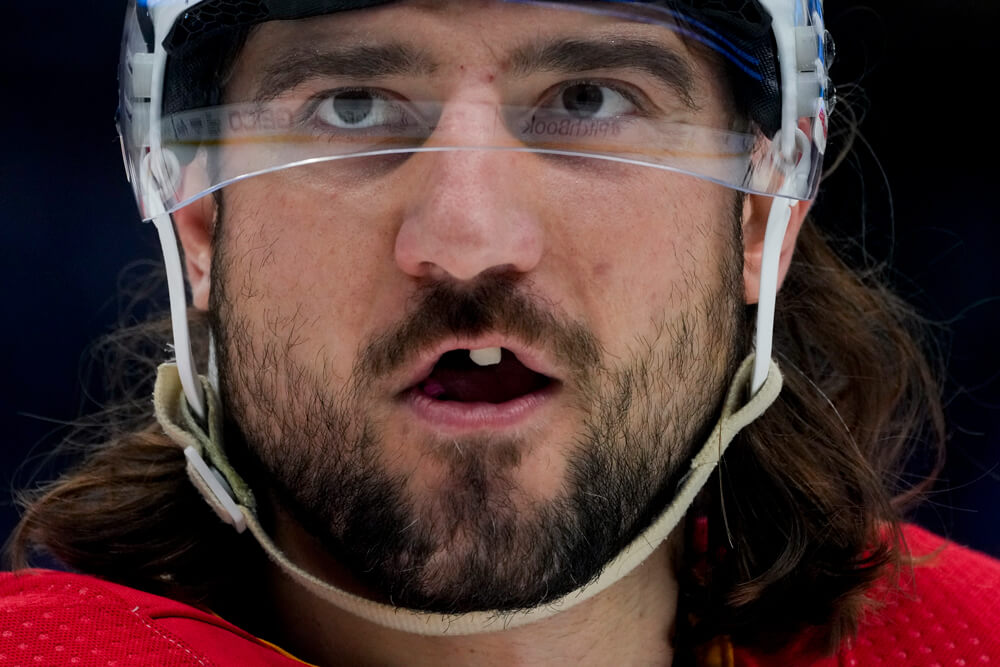
B
efore he veered off the traditional path, Tanev’s early minor-hockey career saw him playing alongside others who’d eventually go on to the NHL. His first year of AAA, at 9, he suited up for the novice North York Canadiens along with P.K. Subban and Steven Stamkos. Subban was a defender and Tanev was a forward early that season, and the two of them swapped positions, which wasn’t a tough transition for Tanev, who’d played on the point for a season when he was eight.
Tanev is a December baby and he was always the smallest kid on his team. But that difference in size began to take on a glaring quality as he got older. Trying out for minor-midget AAA teams when he was 14, Tanev was just five-feet-tall “and probably 99 pounds,” his dad, Mike, says. “There were only 10 teams, and he got cut by seven of them — so basically he was cut by the whole league.”
Tanev cried after he was cut from that seventh team and turned to his dad for an explanation. “I had to console him in a different way,” Mike says, because it was clear his son was one of the better players on the ice. “I had to tell him: ‘It’s not because of anything other than your size.’”
Tanev was going into Grade 10 at East York Collegiate Institute and Mike told him to take a step back from rep hockey, to have fun and play for his high school team. He could play roller hockey in the summers and continue to do on-ice clinics to keep his skills up. Mike figured his oldest son could try out for a junior team in a couple of years — “after he grew,” he adds, which Mike figured was in the cards since he’s five-foot-10 and Tanev’s mom, Sophie Meredith, is five-foot-six.
“To be honest, I probably didn’t realize how small I was compared to everyone else — I think you’re just oblivious at that age almost, you’re just hanging out,” Tanev says. “Obviously you’re down on yourself after not making teams, and it’s just a good time to sort of step away.”
There was a silver lining, too: Since he wasn’t playing rep hockey, he got to see more of his high school buddies. “I made some lifelong friendships that I’m thankful for,” Tanev says.
Rob Greco was East York’s hockey coach that year and remembers clearly when Tanev tried out for the varsity team. “He was so much smarter than everybody else on the ice, and an incredible leader — he was the hardest working, and everyone followed,” says Greco, who named Tanev an assistant captain, despite his youth. “He was a coach’s dream.”
Tanev tried out for four major-midget AAA teams the next year, got cut from all of them, cried again, then went back to play high-school hockey in Grade 11, the same year other guys his age were being drafted into the OHL. “We were skating once or twice a week,” Tanev says of those days, and he figures the level in high school was comparable to select or A, at best.
“Thankfully he didn’t say, ‘No, I don’t want to play anymore,’” Mike says, adding that he and Sophie Meredith were also going through a divorce during that time. “It wasn’t easy, I’m not going to lie. There were three or four things Christopher had to overcome in a couple years as far as adversity goes. But I really believe those things that happened in his life make him the better person that he is today.”
Tanev managed to crack a Junior A team the summer after Grade 11, in 2006, taking the ice with the Durham Fury of the OPJHL. His second season in the league, 2007-08, he was traded twice and ultimately landed with the Markham Waxers. The team’s head coach, Rick Cornacchia, thought so highly of Tanev that he got in touch with the coaching staff of the Div. 1 Rochester Institute of Technology (RIT) to point them in his direction.
A year later, Rick’s son, Mark, a freshman with RIT, found out his team was interested in offering a scholarship to Tanev, who he’d played with on the Waxers. “Wow, that’s interesting. I wonder how his game would translate,” Mark mused to his dad when he passed on the news. “Mark,” Rick replied, “He’s the best player in the league.”
“That was a shock to me,” Mark says now, and it was also the first sign of what he calls Tanev’s “rapid, parabolic rise” over the next year-and-a-half.
“This was a player that really was not on anyone’s radar,” says RIT’s head coach, Wayne Wilson. The team’s assistant coach, Dave Insalaco, figures the fact Tanev took a couple of years off of rep hockey created “hesitancy” in other schools to devote scholarship dollars to the defender. But Insalaco saw him play and was sold: “Elite hockey sense,” he says. “He was thinking the game at a way different level.”
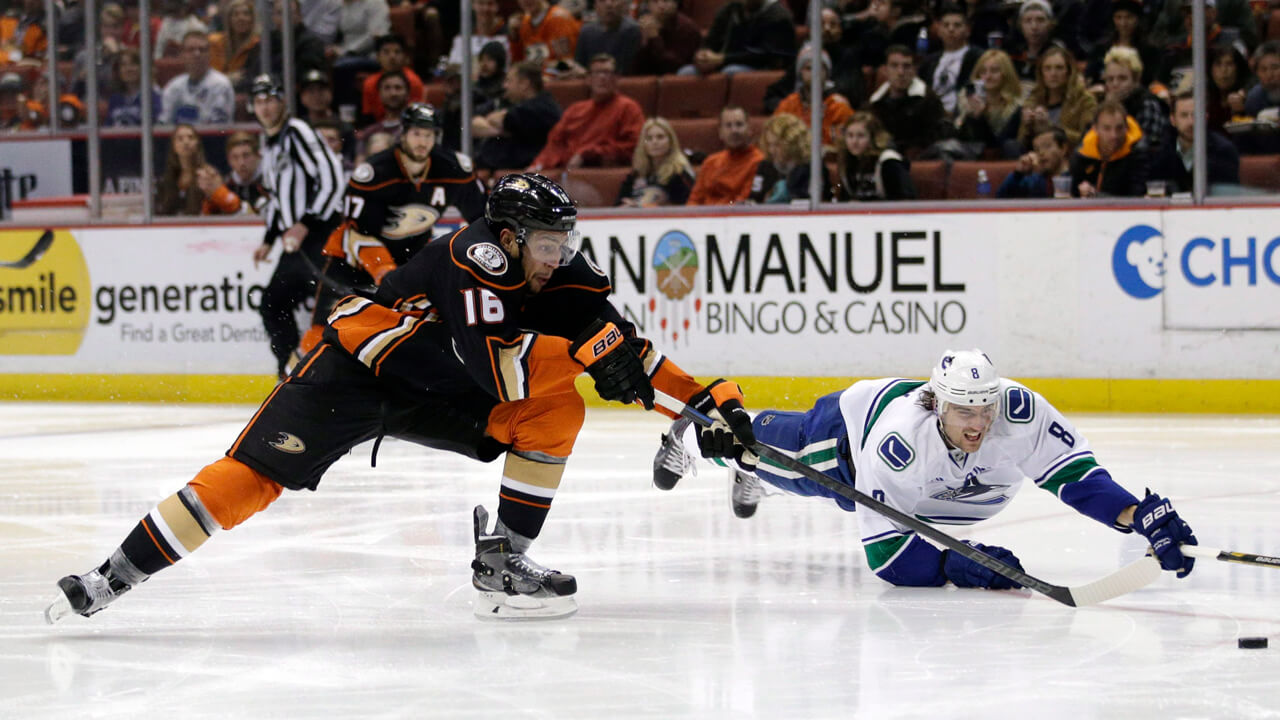
Tanev arrived as a 19-year-old freshman at RIT, the youngest player on the roster and just shy of six-feet-tall thanks to a recent growth spurt. He stepped into the lineup immediately. “He wasn’t the strongest individual, but because of his skating and his length and his anticipatory skills, he could shut things down on the defensive side in a different fashion,” Insalaco says. “He played to his strengths. At the O-zone blue line, he could make seam passes and find guys off the side of the net where your average player just couldn’t.”
“Everyone would just say, ‘Give it to Tanny,’” Wilson adds. “Because he’d make a great play with it.”
By mid-season, Tanev was on the No. 1 D pairing and No. 1 power-play unit. “He jumped over a lot of veterans, but he did it in a graceful and good way — he didn’t upset the apple cart,” Wilson says. “Some guys would be ticked, ‘Why is this rookie getting all this ice time?’ But he’s such a great teammate. He’s just, I don’t want to say, ‘Mr. Perfect,’ but he really has such a good outlook on life and such a good demeanour.”
There’s no doubt in Wilson’s mind that growing up small helped Tanev. “I think there’s a huge benefit to that, because you’ve got to figure out how to survive the game,” he says.
“That’s how I grew up playing — I’m not running through people trying to chase hits around, it’s more body position, stick,” Tanev says. “It’s more trying to think the game: Where’s the puck gonna go next? Can I be there before the other guy? That’s what I had to learn growing up.”
Tanev won Atlantic Hockey’s rookie of the year award in 2010 and helped lead the 15th-ranked RIT on a run to a first-ever Frozen Four. He was six-foot-two by the time that season ended. “But even though I grew, I was still skin and bones,” he says. “I was on all these weight gainers, crushing 2,000-calorie shakes — it did not work.” At 20 years old, Tanev figures he was “maybe 165 pounds.”
That’s why, when Tanev told Wilson and Insalaco he was turning pro after his freshman season, the coaches tried to convince him to stick around for another year. “I didn’t think he was ready, and I say that not from a skill standpoint,” Wilson says. “I was more concerned with: How is he going to physically hold up?”
Tanev signed with the Vancouver Canucks as an undrafted free agent ahead of the 2010-11 season and immediately moved west to work with the team’s staff in the gym. After a solid pre-season training camp, he was sent down to the AHL’s Manitoba Moose, where he lived with fellow defender, Yann Sauvé, and goaltender, Eddie Lack. “I remember it took Chris two-and-a-half hours to eat dinner because he knew he had to put on more weight,” Lack says, laughing as he thinks back to the sight of a wiry Tanev coming down the stairs on cold Winnipeg mornings, three minutes before they had to drive to the rink, wearing fleece Grinch pajama pants he’d keep on all day.
Lack and Tanev were Black Aces for the Canucks during the team’s 2010-11 playoff run. Vancouver played San Jose in the Western Conference Final and the Aces had a rare night off. “We were sitting and having a few beers and watching the game on TV. First Canucks D goes down with an injury and we’re all laughing and joking around with him: ‘Oh yeah, Chris, you’re gonna go and play soon, hey?’” Lack remembers. “Then we all just ordered another beer. And then there’s another injury on a D and Chris just kind of freezes a little bit and we can tell he’s not touching his beer anymore. He’s like ‘Oh shit, what’s gonna happen?’ I think they had a third injury at the end, and he got the call a minute later.”
Tanev was on a flight to San Jose the next day, and made his debut in Game 4 of the Western Conference Final, a 4-2 win on the road that saw him play 9:13 and block a shot. Two days later, he played more than 20 minutes in a 3-2 double-overtime win that sent the Canucks to the Stanley Cup Final. He blocked four shots that game.
He played three games in the Stanley Cup Final against Boston, which the Canucks lost in seven. “I honestly don’t really remember much from it, you’re so in the moment,” Tanev says now. “At the time, I probably thought it was going to happen every year, and you don’t take in as much as you should.”
What does still stand out to Tanev is how the veterans on the team treated him as a rookie, how they welcomed him to the team. What stood out to Wilson, who watched that 2011 Stanley Cup Final from home, was this: “I thought [Milan] Lucic might break him in half,” the coach says, with a laugh. “But it turns out his IQ was just as effective in the NHL as it was with us.”
Told of Wilson’s concern he’d snap in two, Tanev laughs before deciding it’s fair. “I think even guys on my team in Vancouver were like, ‘How’s he gonna survive out there? Who the hell is this guy?’” he says.
That second question is fair, too. After all, the guy quit rep hockey as a teenager and was playing Junior A just two seasons before stepping on the ice in a Cup Final.
Mike calls his son’s career “a 100-per cent fluke,” and Tanev doesn’t disagree there, either.
“It’s definitely an unconventional path,” he says, with a shrug.
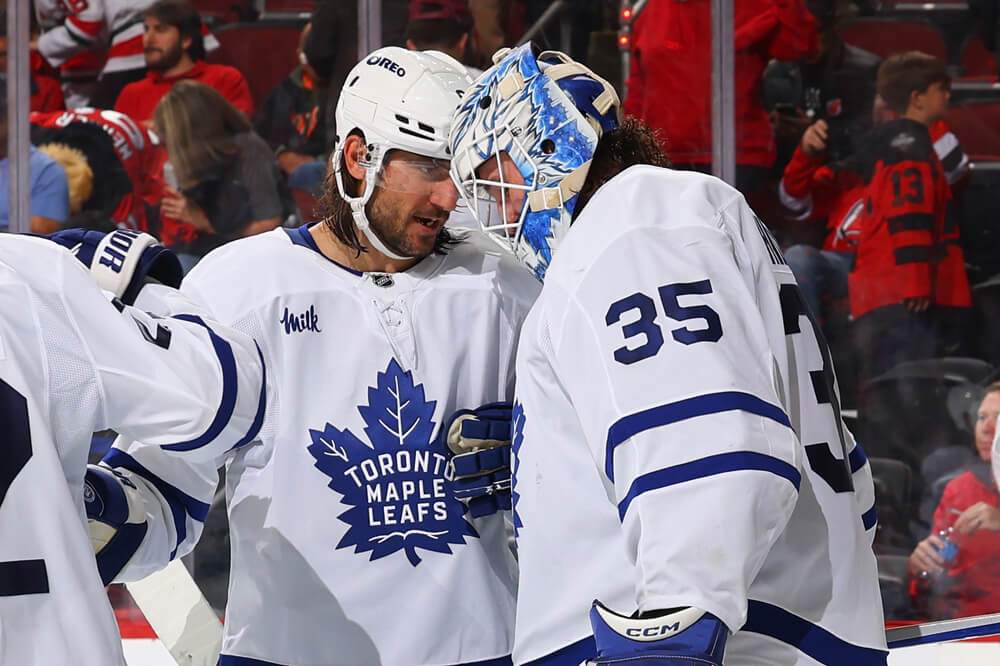
D
uring pre-season training camp in September, Rielly and his wife, Tessa Virtue, had some of Rielly’s Maple Leaf teammates and their partners over for dinner. The group included Tanev and his wife Kendra, who he met at RIT. Tanev asked questions about how life is for Rielly and Virtue with a newborn and he helped clean up after dinner. He and Kendra are expecting their second child in November, and Tanev talked about their nearly two-year-old son, Bobby, whose name is on a beaded bracelet he wears around his wrist.
“After everyone left, my wife said she was a big fan of his, because he’s got that polite, soft-spoken side to him, in a really endearing way. He’s really sweet,” Rielly says. “I don’t want to make him — you know, I want him to be a big, tough hockey player. But he takes his son to the park. He’s got a really nice way about him. When I talk to him in the morning, I ask him how his night was and he asks about me, and he’s got really nice and thoughtful questions.”
Rielly’s early impressions come as no surprise to Hanifin, who had Tanev at his wedding this past summer and calls his pal “a phenomenal, phenomenal person.”
“Whenever he’s talking to you or anybody, he truly cares about you and all of his teammates, the trainers, the staff,” Hanifin says. “When he goes into the room, that’s something everybody notices about him and that’s why he’s so good to have for a culture. He’s a very genuine person.”
Adds Lack, who played with Tanev for four seasons, including two with the Canucks: “I think everyone around him says the same thing: Chris is one of the favourite teammates for a lot of players.” And now that the defender is in his hometown, Lack expects Tanev to thrive. “I think you’re gonna see the best of him because now he’s finally home, and I know he’s been looking to play in Toronto for a while,” he says.
Tanev has always had a place in the city, and returned every summer since he turned pro to see family and to train with Gary Roberts. “Having our kids grow up close to family was important to us, and something that not everyone playing hockey is able to do,” Tanev says. “Fortunately, the opportunity arose for us to come home, and we thought it would be good to take advantage of it.”
As the longest-tenured Maple Leafs player points out, Tanev makes the team instantly better. “It comes down to his defensive awareness and his execution and his ability to constantly be in the right place at the right time, and battle consistently — that stuff is, like, super hard, and he’s been doing it for 15 years,” says Rielly, who’s now in his 12th season in Toronto. “I would describe his play as textbook. Chris does all the little things extremely well — he moves well, he’s always in the right position, he’s got a good stick, he makes the right decisions, he’s sound defensively. To me, that’s what people strive to be, more well-rounded than anything. I think there’s a lot of players, including myself, who want to play like him.”
“He’s so responsible back there in the D zone, and he’s very vocal on the ice and just makes your job a lot easier — he’s always telling you what plays to run,” says Hanifin, who points out that while Tanev isn’t the most physical player, he uses his body to make the game harder on his opponents. “He’s so willing to put his body in difficult positions — it’s not the most fun position for a D to be in when someone’s forechecking you, but he’s willing to do that just to break pucks out all the time and create offence.” A lot of those “little passes out of the D zone” may go unnoticed, adds Hanifin, who signed an eight-year extension with Vegas last season. “A team like Toronto, with as many good forwards as they have, I think they need that. I think he’ll be really helpful in that regard.”
Marner couldn’t agree more. “He makes a lot of great plays with his stick — very good with that first play coming out of the zone with pressure on him,” the winger says. “It’s always fun to have a guy like that, and obviously a guy that’s not afraid to step in front of shots all day long. So, he’s just bringing a great skillset to our team, and we’re happy to have him.”
Tanev blocked the third-most shots in the NHL last season, 207, a career high that averages out to 2.76 blocks per game. But no, he doesn’t get a rush from taking one for the team. “I don’t,” he says, with a small laugh, shaking his head. “I just try to win as much as I can, and I’m willing to do whatever needs to be done.” As the right D, and a guy who kills a lot of penalties, Tanev adds, “I eat a lot of pucks.” Most of his injuries come as a result of those blocks, though his gear has been fine-tuned for maximum protection. “It’s taken a lot of years and equipment trainers have done a great job with that,” Tanev says.
“Character” is the first word that comes to mind when Toronto’s head coach, Craig Berube, thinks of Tanev. “He’s an ultimate team guy, and I think that sums it up right there,” Berube says. “That’s what he’s all about, is the team.” Tanev isn’t outspoken, the coach notes, but he’ll speak up when asked. “From a coach’s perspective, like if I go ask him something, he’s going to tell me the truth and he’s going to tell me what he’s feeling,” Berube says.
Tanev was an alternate captain for the Flames, and he led by example. “He plays such a hard-nosed game and puts his body on the line a lot and he does it for his teammates,” Hanifin says. “I’ve seen Chris play through some horrible injuries that not a lot of guys in this league would play through, and you never hear a word about it. He doesn’t complain, he just shows up to work every day. That whole mindset and the way he carries himself, that’s how he leads. He inspires all his teammates to go out and give it all they have, because he does that every single night. Those are the things that really matter in a culture, in a locker room.”
Hanifin thinks some of those qualities are thanks in part to the route Tanev took to this league. “He doesn’t take any days for granted in the NHL,” he says. “I think now that he’s here, his whole career, the way it’s blossomed, I think he is super appreciative of it, and that’s why he plays every game like it’s his last, honestly.”
Tanev is now bringing those skills and that mindset to a team under a major microscope, facing high expectations that haven’t been met in decades. Those who know him best say the pressure won’t get to him. “He’s as grounded a person as you’ll find,” says Mark Cornacchia, who’s excited to have his buddy back home in Toronto, full-time.
“Christopher doesn’t show any emotion — like, zero,” says Mike, adding his eldest son is a lot like his grandfathers, who were both calm and laid back. “Water just rolls off Chris’s back, like a duck.”
With a late-September special teams practice wrapped up, Tanev is standing outside the arena wearing his Maple Leafs ballcap backwards, with his dark hair tucked behind his ears. He looks up briefly as he thinks back to the last competitive team he played for in Toronto, a season before he got cut and shed some tears and left the elite levels of the game behind for a stretch. He was 14 and in Grade 9, with the AAA Mississauga Reps, and he recalls it was a good season.
“I thought I was a pretty good player, and it obviously didn’t work out after that,” he says. “But, I mean, that’s life. Things don’t go your way all the time, so you’ve gotta battle through.”
Ain’t that the truth.
And now the team that’ll have to do plenty of battling to find some long-awaited success has the help of a homegrown snaggle-toothed defenceman who’s made a career of exactly that.
David Kirouac/Icon Sportswire via Getty Images; Lindsey Wasson/AP; Jae C. Hong/AP; Rich Graessle/NHLI via Getty Images.


